NEWS LETTER
October 2025
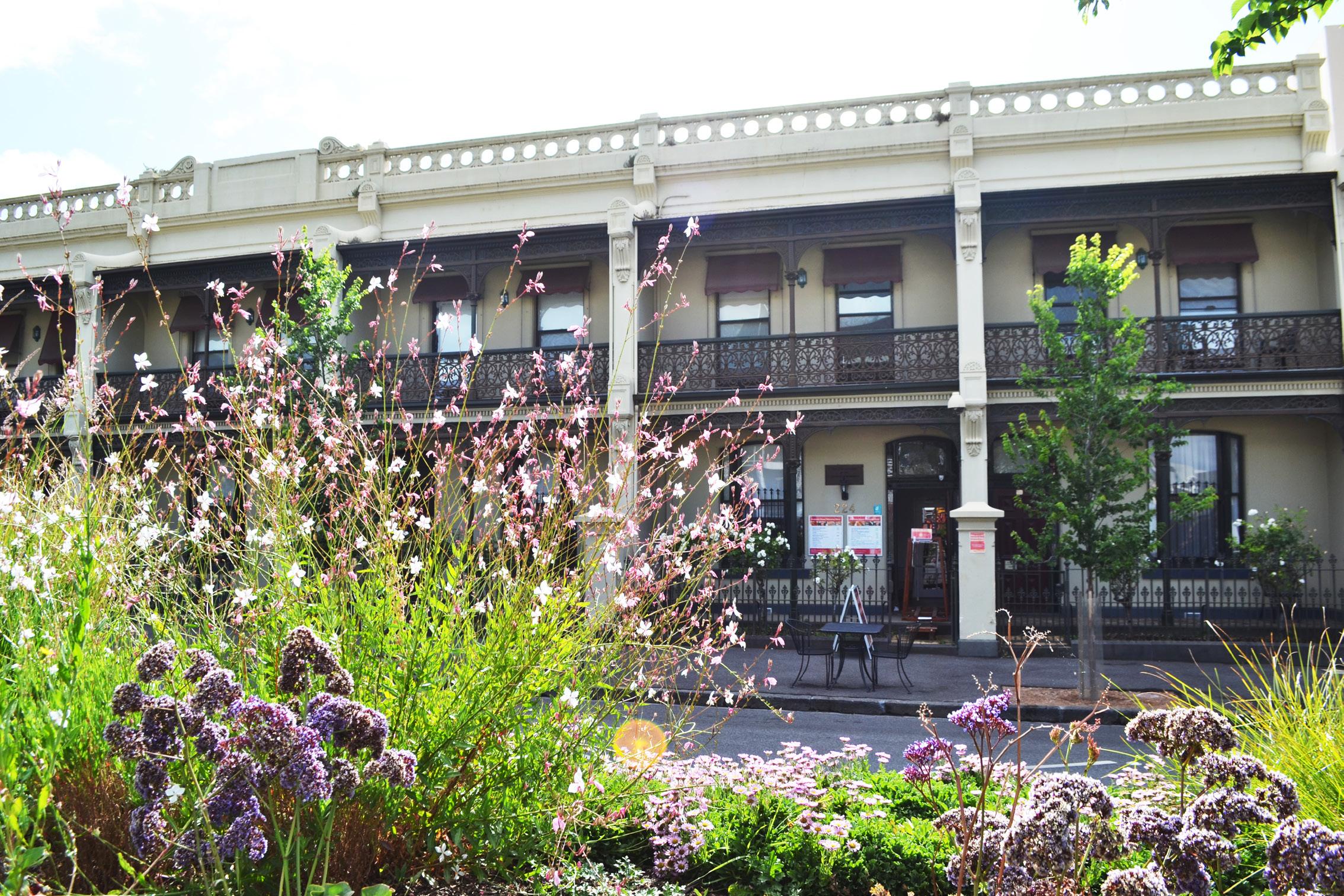
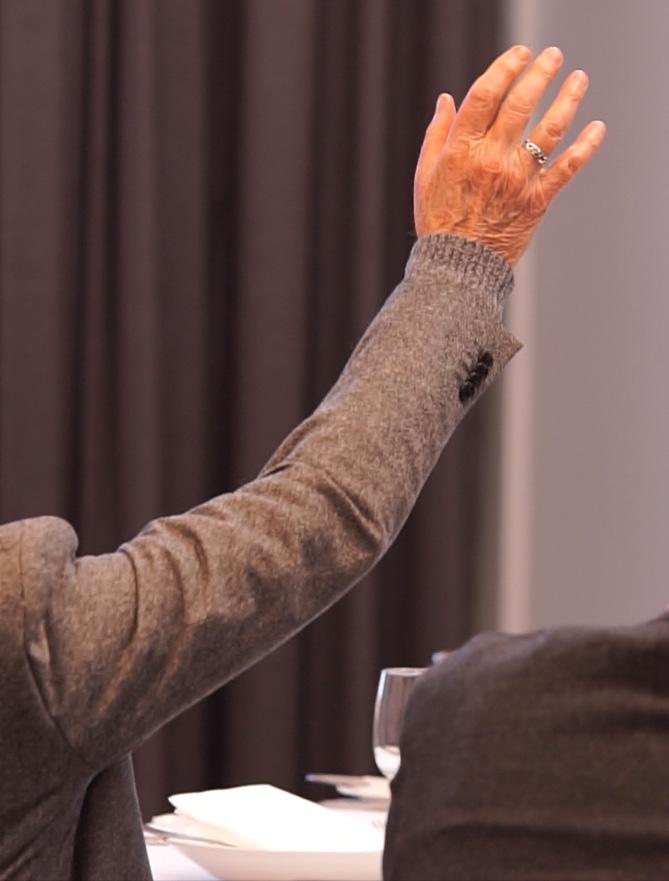
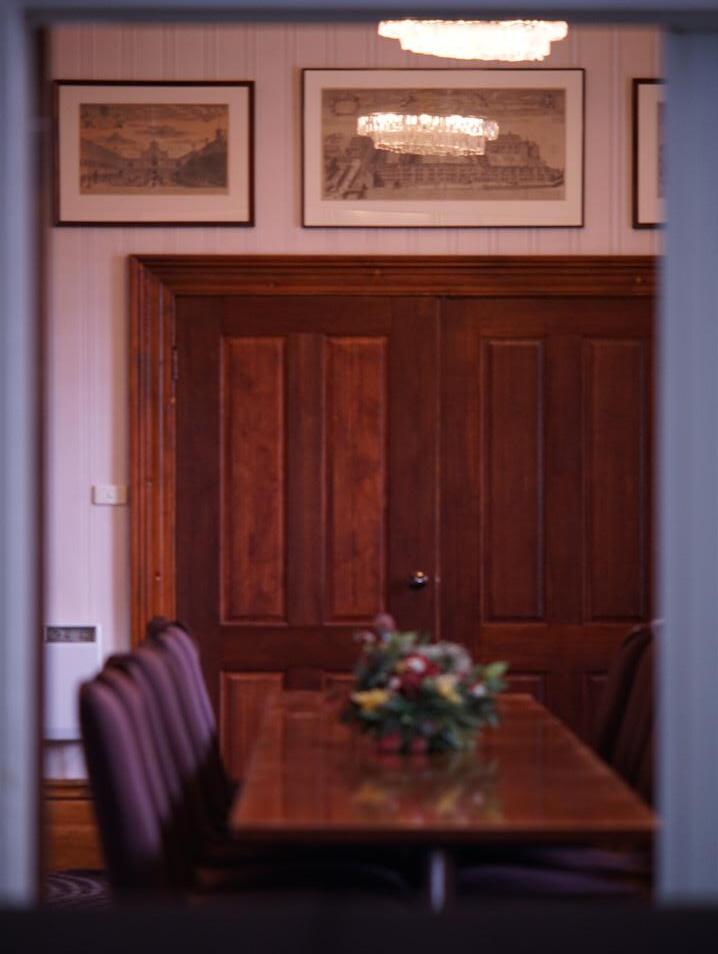
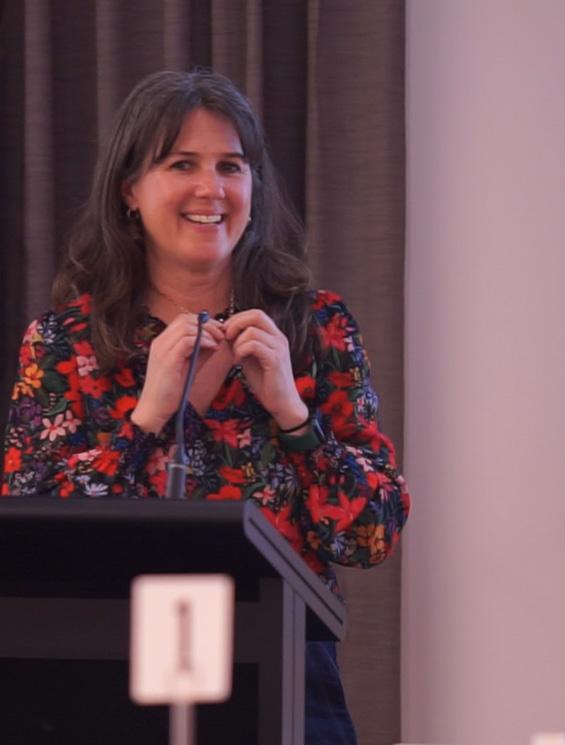
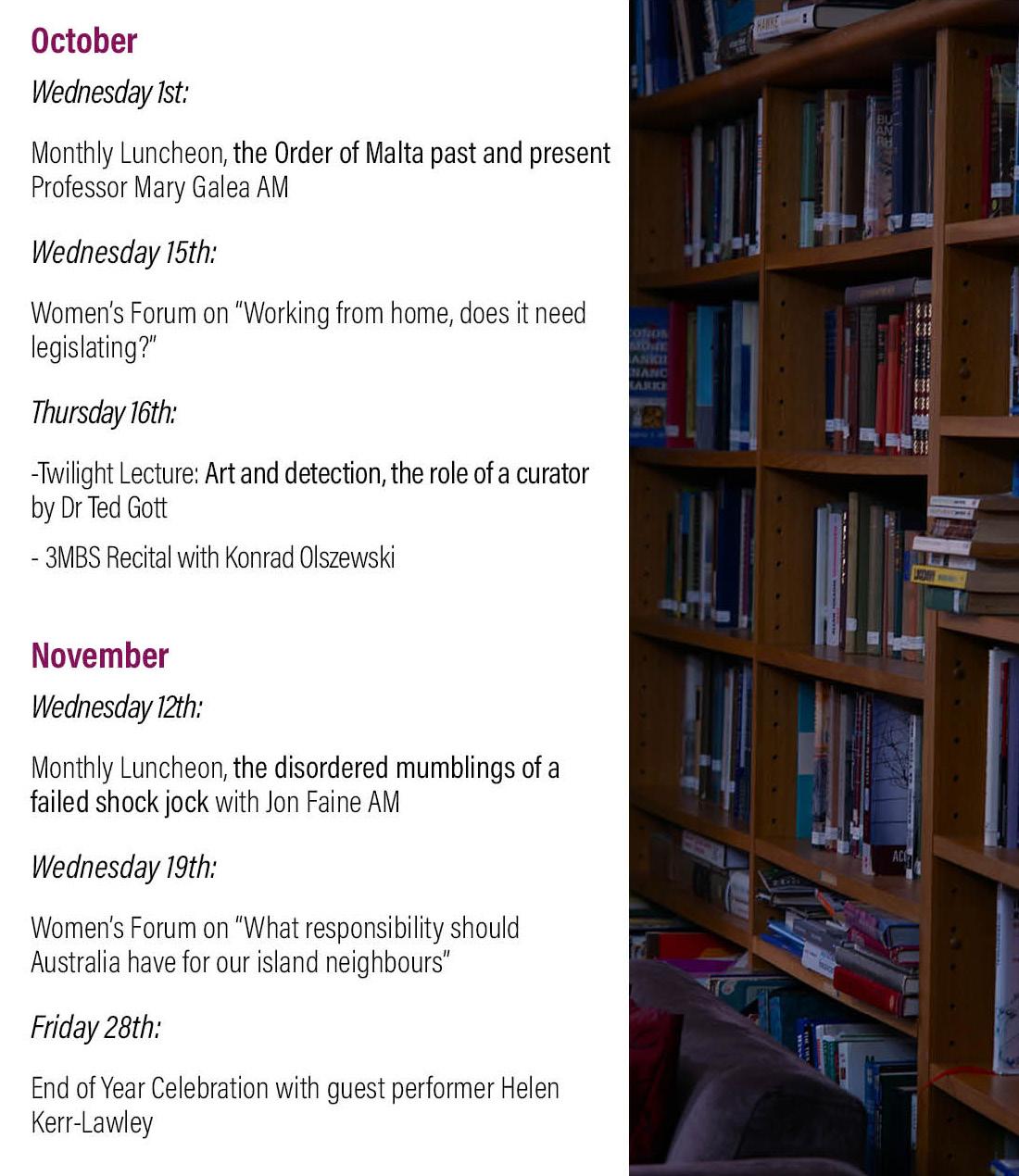

October 2025





There was a healthy turnout for the September 18 Twilight Lecture, both at Graduate House and online, where Prof Philomena Murray discussed several complex challenges that Europe is facing. She highlighted a perception of crisis across Europe, shaped by changing dynamics of international diplomacy, trade relations and evolving roles of global and national actors.
There is also a perception that European cultures and identities are being undermined. European values of humanitarianism are under threat from right wing extremism. There is binary sense of winners and losers.
“The EU is being drawn in two directions, by the protection of its interests on one hand and the need to stick to its values,” she noted.
The values of peace and stability, born out of postWorld War II peace building, economic recovery and democratic consolidation, remain central to the European Union (EU) today. The EU was awarded the Nobel Peace prize in 2012.
Prof Murray explained the EU’s global influence: it is a major trade negotiator, the largest exporter and importer of goods and services worldwide as a single market and, further, it is the world’s largest development aid provider.
The EU’s creation was also a response to the external threat of Stalin’s Russia; the Cold War and
the division of East and West Europe. The United States acted as a security guarantor within NATO.
Currently, President Trump has shocked European states. Established alliances and security arrangements are now in question relating to NATO; Russia and Ukraine. No longer can the EU and European states rely on its closest ally since the 1950s.
The distancing from its original values that is taking place within the European Union is most evident in migration. The decision by governments and the EU to distance themselves from a values-based approach creates a dissonance where they present the imperative to ‘save lives at sea’ that takes precedence over providing access to rights. Also, there has been recourse to the familiar paradigm of border security, characterised by the language of exclusionism and national interest, of, for example, breaking a business model of people-smuggling.
The EU and most of its states have shifted responsibility beyond their borders, which undermines their legitimacy as credible governance actors while, at the same time, undermining democracy.
Migration and refugees are a focus of the far right in much of Europe. There are currently far-right parties in government in eight European countries: Croatia, the Czech republic, Finland, Hungary, Italy,

Belgium, the Netherlands and Slovakia. Populist and far-right parties are the most popular parties in France, the Netherlands, the Czech Republic and the UK.
The far right draws on and amplifies experiences of economic precarity, concerns about housing and health – a perception of livelihood insecurity and societal insecurity. They often scapegoat refugees. They present narratives of a nativist culture being under threat from certain groups, ethnicities, religions and minorities.
Prof Murray expressed the need to hold the far right and the media accountable. National and EU leaders must be urged to decline to work with the far right, to challenge them and to refute their arguments. The absence of an equally simple counter-narrative means that populist political parties dominate parts of the media, which often gives oxygen to exclusionist rhetoric. The EU must take more action on Russian funding for far right groups. The EU can show it relates to citizens and noncitizens across Europe by illustrating that it is tackling pressing economic and social issues, although improvements are required. It must
tackle seriously-held concerns about regional and national identity. Youth unemployment remains high, at just under 15%. The EU has supported the livelihoods of rural people, through agritourism, green agriculture, food safety and food security, but hasn’t told that story convincingly. The economic and social aspects of the EU’s narrative are not as widely known as the peace project of the EU. The EU could do well to amplify the many benefits for citizens, ranging from the right to live, work and study in another country to support for vocational education and training, for example.
Prof Murray illustrated that the EU already has programs in place, although without a narrative of reconstruction of society for equality, in the same way there was a narrative reconstruction in the postwar period. It must also continue to increase its defence funding, with credible, effective, and sustainable security guarantees to Ukraine.
Prof Murray shared a number of strategies for the EU to deal with crises, and become more engaged with its citizenry, and concluded that the EU also “needs to get its good news right. It needs to be a better storyteller.”
Angela Gillham, “Australia is a Maritime Nation with big challenges in a time of opportunity”
By Dr Patricia Smith

A goodly number of members and friends assembled for the September luncheon. A convivial lot who were soon enjoying the pre-luncheon drinks and meeting old friends, making new ones and looking forward to meeting the speaker, Angela Gillham, who is the Chief Executive Officer of Maritime Industry Australia Ltd (MIAL).
Talk soon turned to wondering about the subject. The maritime industry had not, hitherto, been high on our list of interests. Someone commented that they had learned not to pre-judge any topic at the luncheons because quite unexpected ones often turned out to be the most interesting! Perhaps the talk would be about the maritime route north
to China past the Philippines! Maybe a discussion of environmental issues! Perhaps AUKUS would get a mention.
“Australia has been left vulnerable by decades of neglect of the maritime industry, which has resulted in our near total reliance on foreign interests”
Angela started by explaining her role. She reports to the MIAL Board of Directors and is at the helm of the MIAL Secretariat. This means she is responsible for the strategic direction, key projects, and policy settings advocated on behalf of MIAL members – a diverse range of businesses operating maritime assets to, from and within Australia. All sea-going vessels that are not Navy fleet are included.
Instead of leaving us rather at sea (I couldn’t resist the pun!), Angela invited us to turn the lecture into
a discussion. The slide depicting the logos showed many companies that are members of MIAL but were obscure for many of us. Some knowledgeable members asked questions about ferry and other companies. Yes. Pilots are included.
It turns out that about 90 something per cent of the companies are not Australian owned. “We are a large island at the end of the global supply chain and are highly dependent on shipping to underpin our economy and way of life. Yet Australia has been left vulnerable by decades of neglect for the maritime industry which has resulted in our near total reliance on foreign interests to deliver our broader maritime task.” Now Angela had our attention and, indeed, she supported a lively discussion and not a lecture.
She explained that, 99% of Australia’s imports and exports travel by sea. This includes consumer goods, chemicals and even our liquid fuel, which is not refined in the country and is all imported. Agriculture needs the fuel and without it our food supply would fail. There’s also a relevant trade flow around Australia, for example moving iron and concrete from coast to coast, which keeps our manufacturing and construction industries moving.
In a country as reliant on sea traffic as ours, the number of vessels that trade internationally under Australian flags has been reduced to nine during the last 50 years.
Beyond our reliance on supplies, which is a very important matter already, we face the challenge of our limited capability to respond to natural disasters.
Angela reminded us about the unprecedented fires in far Gippsland when the people of Mallacoota were trapped with nowhere to go. You may recall the generosity of the navy crew who evacuated Mallacoota residents on the large combat vessel, HMAS Choules, that day. Staff had given up their holidays to spend 16 hours preparing the ship for around 1,000 people, making a 20-hour journey to the Port of Hastings.

In scenarios like that one, the Government has no tools to direct ships under a foreign flag to do anything. And that is a problem to which politicians and policy makers are currently turning their minds.
But how do we solve such vulnerability? There’s several factors that have brought Australia’s shipping industry to its current state. One of them is tax-related costs, wether they are related to wages or corporate taxes. So, to make shipping under an Australian flag more competitive, MIAL is working on proposals to remove the tax component from seafarers’ wages and implement a zero corporate tax regime for shipping to align with international norms.
Who would have thought that there would be such a lively discussion about what was needed to fix the situation! And how ineteresting it was to have an argument about changing the tax system to bolster an Australian merchant fleet.

Another important factor mentioned by our speaker is what she calls the “maritime skills crisis”. It takes a long time to reach the level of skills required to operate these vessels. For example, it takes about ten years to become a Ship Master or Chief Engineer, and once people reach that level of experience, they tend to move on to land-based jobs for better pay and more time at home. So the workforce is constantly changing, training new people is expensive, and there’s not enough of an influx of young people into the field.
To create a training program that saves costs, and puts this career path in the spotlight to attract young adventurers willing to take on these roles, is a challenging but essential task. Creating a constant influx of trainees will ensure the industry keeps running. To achieve that, MIAL and the
Royal Australian Navy are working to create better pathways that allow people to move between military and merchant roles at sea.
At the end of her presentation, Angela concluded by warning that progress will require a long term, stable policy approach at the Commonwealth level. While the Government is signalling progress in these areas through the Maritime Strategic Fleet Policy and the Transport and Infrastructure Net Zero Road Map, much more is needed, and Angela has a major role in creating bridges between industry and Government to shore up our country’s maritime capability.
Thanks to Angela for one of the most interesting and lively Luncheons of this year, and we welcome her as a new member of Graduate Union!

Wednesday, 1 st October


By Professor Mary Galea AM
Time: 12:00pm for 12:30pm start
Online login: 1:10pm for 1:15pm start
Professor Mary Galea, AM FAHMS, is a Professorial Fellow in the Department of Medicine at the University of Melbourne. Her research in basic and clinical neuroscience has contributed to understanding the organisation and development of the motor system and its recovery from injury. She is also a member of the Australian Association of the Order of Malta and a member of the Order of Malta – Mercy Palliative Care Volunteer Program Steering Committee.
The Order of Malta has a 970-year-old tradition of providing care for the sick and the poor. It established a hospital in Jerusalem to care for pilgrims to the Holy Land and later established hospitals throughout Asia Minor, in Rhodes and eventually in Malta. The full name of the Order is the Sovereign Military Hospitaller Order of St John of Jerusalem, of Rhodes and of Malta, and the 8-pointed cross is the emblem of its medical and humanitarian activities worldwide. It still runs hospitals and Medical Clinics in many parts of the world, especially in developing countries, as well as an international aid organisation which is deployed to provide emergency relief in crisis situations and natural disasters. This talk will provide an overview of the Order’s illustrious history, its expansion to many countries, and its continued mission to defend the sick and the poor.
Prices:


To Book:
Members $42, non-members $47, Residents $15
Virtual: Members $10, non-members $15
Call: 03 9347 3428
Email: admingh@graduatehouse.com.au
Graduate House & 3MBS present

Thursday, 16th of October, 1:00 - 2:00pm
Lunch from 12:00 to 1:00pm

Konrad Olszewski is a professional pianist in great demand as a performer, accompanist, repetiteur and teacher. He completed his Master of Music degree with a postgraduate scholarship at the University of Melbourne, studying with Glenn Riddle. While at the University of Melbourne, Konrad received many awards, including the J.S. Bach Prize, the Lady Turner Exhibition Prize and the Searle Piano Faculty Merit Scholarship. He was selected as one of 20 finalists to participate in the Sydney International Piano Competition and won the John Allison/B.M. Henderson Piano Scholarship at the Sydney Eisteddfod. Konrad has studied overseas with leading virtuosos including Leslie Howard (London), Piotr Paleczny (Warsaw) and Klaus Hellwig (Berlin). He is regularly invited to perform recitals around Australia, including performances at the BMW (now Deakin) Edge in Melbourne and the Sydney Town Hall, where he recently performed the Paderewski Piano Concerto.
As an associate artist, he has won numerous awards, notably at the Liederfest and Mietta Song competition. Most recently, he won the Richard Bonynge accompanist prize at the 2023 Sydney International Song Prize competition.
Prices: Concert - $20 / Three course lunch - $20 For bookings call us at 03 9347 3428 or send an email to membership@graduatehouse.com.au
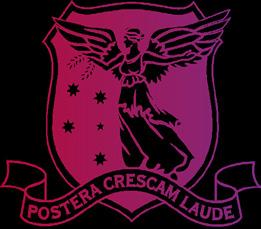



By Dr Ted Gott, Senior Curator of International Art at the NGV
Time: 5:30 for 6:00pm start
I am often asked just what a curator does. Of course, we look after the permanent collections of the institutions where we work; organize the public display of works from them; and also prepare thematic exhibitions that often incorporate loans from other collections. But we also frequently encounter “mysteries” in our work. And this is where the art of detection comes into play, and we don our deerstalker hats. In September 2006 the National Gallery of Victoria acquired at auction a remarkable painting by a virtually unknown artist: Christ Turning Out the Money Lenders, a work attributed by the auction house to a ‘Louis Duffy, 20th century’. We’d taken a punt, knowing absolutely nothing about the artist. As it turned out, no-one else knew anything about him, either. In this talk I explain how, through extensive detective work, I was able to solve the mystery of Louis Duffy, and recover the remarkable story of his life and art.


This event is FREE thanks to the sponsorhip of DeBortoli. On the day, guests will enjoy a curated wine tasting featuring their wines.
To mark your attendance call us at 03 9347 3428 or email admingh@graduatehouse.com.au
Graduate Union Council member and Deputy Chair, Emeritus Professor Martin Comte OAM continues his interview series.
President
Martin Comte
MC: Many thanks for agreeing to be interviewed, Diya. I have had the pleasure of talking to you a few times this year regarding your plans and ideas for our residents at Graduate House: today I would like you to share these further. But first, tell me something about yourself. When did you arrive at the Graduate House?
DG: I arrived here on July the 12th, 2024. I remember that it was 1.00 a.m and a very rainy day. I did not have my Australian SIM in my cell phone, which was a problem. I had come from the airport by cab and I was very nervous. The person who opened the door for me when I arrived was extremely helpful and very friendly. Once I entered the building it all seemed so nice and homely. After meeting everyone the next day, I have been looking forward to having breakfast and dinner ever since.
MC: What degree did you come here to study?
DG: I’m studying for a Master of Management (Human Resources). It’s a twoyear course and I have already completed the first year. Around this time next year I will be a graduate!

MC: Which part of India do you come from?
DG: I was born and brought up my whole life in Delhi. Before coming here I had never stayed away from my parents or even moved to another state. The farthest I had been away from my parents was visiting close by with my aunt or maternal grandmother. Everything – my schooling, my college, even my work – has been close to my home: places where I could take a metro inside the city or drive in a car. Prior to coming here, the only place I had visited away from home was travelling to Singapore for fifteen days, where one of my aunts lived. It was amazing! I think it somehow triggered in me a desire to travel further.
MC: Why did you choose to come to Australia to study?
DF: In many traditional families like mine in India, girls always stay with their parents
until they marry or move out because of work or study. There is a joke that if you want to travel around, just get married! However, parents are becoming more supportive of their daughters moving out, especially to pursue higher education in better universities away from their city. I think that in the back of my mind I have always wanted to challenge myself and explore the wide world. Certainly, for some time I had wanted to see what it is like to leave home and be my own person and not be dependent on others or have someone give an opinion on what I do or the way I do it. I now know how good it is to feel so independent – doing your own thing, like cooking, or going out and exploring the city on your own, or making new friends; starting everything from scratch by yourself. It’s challenging: I sometimes feel very homesick and anxious, but I’ve met many other students like me who share similar stories. But, I’m very proud of my decision to come here. Meeting so many people and hearing their stories about their background has empowered me so much that I now want to explore what is beyond Australia!
MC: Diya, this is a most beautiful, heartfelt statement. I can sense your joy, and also empathise to some degree with the enormity of the decisions you have made. Of course, you are not alone in what you have described. To varying degrees I suspect that this applies to most of the
international students who come to study in Australia. I feel that university professors and university personnel in general are not always sensitive to this. What strikes me also with respect to students like yourself, who come from a wide range of backgrounds and life experience – and, of course, do not have English as their first language – is the enormity of the challenges. Of course, for some it is much easier than for others. Regardless, I believe it ‘demands’ a sensitivity on the part of the people they encounter here. Having said this, it gives me some joy in knowing that when international students become residents in Graduate House (and other residential colleges) they at least have the company of others with whom they can readily share their issues –be they emotional or social – and hopefully find this as a source of comfort and support.
DG: I would like to add that – unfortunately, perhaps – because we in India have been colonised by the British and their influence on the education system, English comes fairly naturally to many of us, especially in Delhi. It’s important today from a job perspective and social standing. Interestingly, while there is no single national language in India, my primary language is Hindi. I feel disheartened about this because I’m aware that my fluency in my own language is lost to a degree due to stronger emphasis on English language since an early age. I regret now that in my schooling I took French as my third subject, when I could just as easily
have taken Sanskrit. Of course, it was my limited knowledge at the time that resulted in me making the decision I did.
MC: I hope I won’t sound patronising when I say how eloquent your English is. This makes me wonder about your schooling. You strike me as having always been a curious school student who was fascinated with learning.
DG: I was creative and loved drawing and always thought that I would go into a field related to this. My parents had an artistic streak, especially my Dad, and my Mum was a teacher; I think that they both wanted my sister and me to be curious. Certainly, we had a lot of opportunities to explore things. But I realised that a career in the arts was undervalued and, later, I became interested in psychology. I have told you about the trip I made to Singapore: it was perhaps the most reckless decision I have made! I had made some applications for university, but I had not received any feedback at that point in terms of getting into psychology. So I made the impulsive decision to enrol myself into Human Resources. I thought that when I get back from visiting Singapore I would sort it out. And when I returned I decided just to give Human Resources a go! But after I had completed one year in HR I did not feel motivated enough, so I started applying for art schools to study MA in Fine Arts, but I couldn’t get into any and decided to complete my degree in HR only. In my last year, I had an opportunity to work with
an HR consulting start-up and I really loved what they were doing. Later, I worked with them full-time for over a year. Today, I can’t think about doing anything else.
MC: You clearly demonstrated an element of courage back then.
DG: It was reckless, Martin. My parents weren’t really happy with my approach but they were still supportive and proud of me. I also never really wanted to work in the corporate field. But I continued with a business degree as one of my uncles, who worked at a high level role in one of the reputed banks, could guide me with the whole process. At that time, I was not particularly happy about this but, in retrospect, I’m now comfortable with the decisions I made. And on reflection, it is the sum of all of the decisions I made that has brought me here.
MC: Your story is wonderful and, of course, personal to you. I am always fascinated to learn about the stories of the students I teach or meet. Why did you choose to come to Australia – and to study at The University of Melbourne?
DG: There were a lot of practical reasons; it was a combination of things. This involved looking at the economy, how accepting Australia was towards international students, how far it is from India, and the weather (I cannot survive in really cold weather!). I didn’t realise that Melbourne can be very cold, but my aunt had had a trip
to New Zealand and to Melbourne and had been investigating degrees in commerce for my brother – though he later chose to pursue his bachelor’s degree in finance from the US. I also talked to a lot of people about The University of Melbourne and the course I was interested in studying, and I loved what they were telling me. I was also aware of the great mix of cultures in Melbourne and how it is the hub of diversity. All of this made it enticing enough for me to come here. Even if it didn’t work, the one thing that remained strongly in my mind was meeting people from different backgrounds, and having an opportunity to explore the different cultures. In my school we used to have a lot of exchange programs – which involved Danish or German students who would come stay in the homes of Indian students and vice versa. Although I never had this opportunity, the possibility of this type of experience was always in the back of my mind. I saw coming to Melbourne as a beautiful opportunity to explore new things, and I knew that even if things don’t work out I always have a place back in India. I should add that it took me two years to convince my parents about this. For all of us this whole process was very daunting. We initially thought about Canada: one of my mother’s best friends lived there and it was thought that she would be there as a support. We also looked at Ireland and England. And Singapore as well – but there were several restrictions in terms of
pursuing a career there; there was limited possibility of ever working in Singapore. I’m so happy to be here. I wouldn’t have been able to see kangaroos or koalas elsewhere – and I’ve met some of the best people. Let me share a very personal story: when I was growing up I had a lot of friends – but I would never call them ‘best friends’. Here in Australia, at Graduate House, I have formed one of my strongest friendships – with a Japanese student who was also a resident here, and I’m so happy that I met her. She has now graduated and returned to Japan, but I text her regularly and promised to pay a visit to her once I complete my degree and get a job. When I first arrived I met some Indian students, but I realised that I had very different views from them. This was surprising because people usually gel with their own community before expanding their circle. But for me it was the opposite. It was more recently that my circle of friends embraced those from India and I cannot see myself without them. There was a sense of realization with them that I had almost forgotten about my roots – but now I realise that I had missed the element of being with my own people. Having said this, I’m most grateful for the opportunities I have to meet people from a broad cultural spectrum and learn about them and their cultures.
MC: What led to you choosing to live in Graduate House?
DG: A lot of my friends in India whose brothers or cousins had gone abroad told me some horrible stories about being scammed etc. in different countries. I didn’t know what to do, but I spoke to someone who lived here for about two years during Covid and she convinced me that this is a place where I would be happy staying for a long time. She recommended Graduate House to me and told me that meals are provided also, and that I would meet a lot of people, including professors, PhD students, and so on. And she said that this will give me much more exposure to like-minded people. In my search I had read about Graduate House but, more importantly, it was her assurance that helped me make my decision. So I decided just to apply to live here for six months to see if things worked out. And I’m still living here fourteen months later. I’m so happy that I met her and came to live here. I wouldn’t want to be in any other place – it’s so homely and comfy, and even just getting support with the room cleaning was attractive, as well, of course, as my meals. As I’ve said, I’ve made so many friendships, and the staff is always welcoming. The responses to the many questions I asked when I contacted Graduate House before coming here also persuaded me. Of course, in my search I was looking at other accommodation possibilities, but somehow this seemed more like home.
MC: I’m delighted that you are now the President of the Graduate Residents’ Association. How did you get involved with it?
DG: This place was giving me so much, especially in terms of friendship, and I know almost everyone. And it’s the little things, like other residents knowing you as well. Perhaps these are little things, but they make you feel close to the place. I had a feeling of just wanting to give back, and I began getting involved about last October. Of course, we have our share of challenges. We all have our own priorities, but I think it’s important that we find a way of working with this. One of the last things that we talked about at our last meeting was the importance of residents having a voice. And I’m delighted that I have now recently joined the Graduate Union Council’s Advancement Committee, along with two other newly appointed residents. I think that because the residents don’t feel they have a voice, they don’t want to participate in activities that have been offered by us. But a few days ago – when we were invited to help ‘re-decorate’ the main dining room and the reception area, and we were asked not only to consider several other paintings currently in storage to display, but also to suggest other possibilities for putting our personalities on the area – that we felt empowered. I think this is a great start: a great foundation for us as the resident student group to work co-operatively with
management – to have a voice – for our mutual benefit. Our resident association doesn’t have a lot of money, so we can’t engage in extravagant events, but we have found that easy, fun, activities are popular – big events don’t work out for everyone. Our association’s committee members are committed to reaching out to all residents, given the restrictions of not having a large budget.
MC: I must say that after my introductory meeting with you and the others who will be contributing to the ‘re-decoration’ project of the dining area, I’m even more excited – as I am in hearing about your wonderful aims for the ‘rejuvenation’ of the residents association. I agree that it’s almost impossible to find activities that everyone will want to do – but there are numerous possibilities for smaller, inexpensive activities. I’m thinking of such things as spending an afternoon in Melbourne’s Botanic Gardens, or the Melbourne Zoo. And day trips to country towns are another possibility. Or a day bus trip to the Healesville Sanctuary where you see animals and birds in more natural surrounds (and on the way you will pass some of Victoria’s spectacular vineyards in beautiful countryside). In the past few years I have taken my own university students by train for day trips to Bendigo, Ballarat and Castlemaine. For most of them it was their first trip away from the environs of the city.
I also know that quite recently some of our residents at Graduate House have arranged
weekend or longer trips to Tasmania or Sydney for themselves. For international students, especially, I encourage them to explore our State of Victoria and, of course, further afield.
DG: Recently we’ve been talking about arranging a sporting event, like a ping pong competition – and even purchasing an inexpensive gift voucher for the winner. I know that bowling and ice skating are also possibilities. We need to work on this – and not necessarily think of things that will involve everybody in the same event or activity. Already, I’m thinking of taking your suggestion of arranging a trip to the Botanic Gardens. You’ve raised a few things that I hadn’t thought about. I’m so glad that I’ve had this opportunity to talk to you, because sometimes, when we express our ideas aloud, it can assist us to progress them further. In a sense, it has also been a reinforcement of ‘self’ for me.
MC: Diya, you’ve excited me in your discussions of new possibilities to engage our residents. We all are extremely fortunate to have you considering ways of rejuvenating the lived experience of residents at Graduate House. w
Graduate House is proudly located in the precinct of a globally ranked University
The University of Melbourne has ranked in the world’s top 20 universities for 2025 (QS World University Rankings) and remains Australia’s top performer across several other major rankings.
This recognition reflects Melbourne University’s world-class teaching, research power, and global reputation — it’s great news for students who want a degree that stands out on the global stage.
No matter which Melbourne university you attend — Melbourne, RMIT, Monash, La Trobe, VU — finding the right place to live is key to thriving academically and personally.
Graduate House is a standout option for postgraduates, visiting researchers, and even final-year undergraduates who want:
• A prime location — in the heart of Carlton, just steps from the University of
Melbourne and close to RMIT, trams, and the CBD.
• All-inclusive living — meals, utilities, Wi-Fi, cleaning, and laundry are sorted, so you can focus on your studies (and your social life!).
• Flexible stays — from a night to a year or more, perfect for short courses, research visits, or full degrees.
• A built-in network — live with a diverse, inspiring community of graduates, researchers, and professionals from around the world.
Melbourne’s global reputation for education has never been stronger — and living at Graduate House makes the most of it. With comfort, convenience, and community all in one place, it’s the smart choice for students from any university who want to get the best out of their time in this world-class city.







of The University of Melbourne Inc.
220 Leicester Street, Carlton, Victoria 3053, Australia
Telephone: +61 (0)3 9347 3428
Australian Business Number: 55 610 664 963
Incorporated Association Registration Number: A0023234B